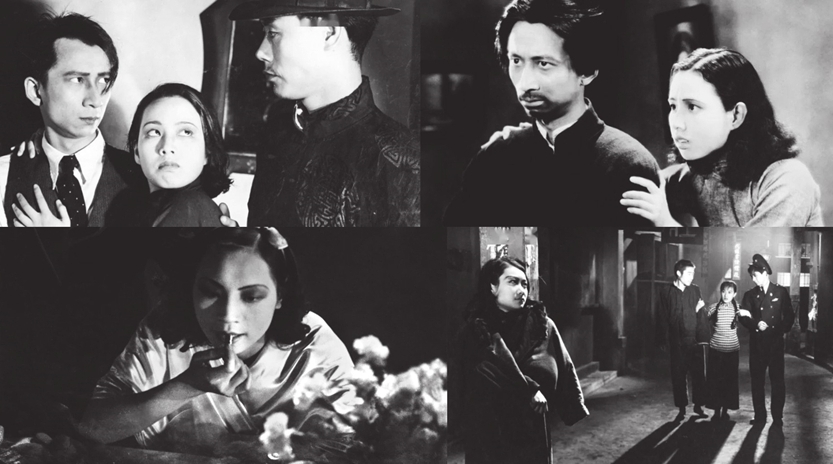Organizers of the 27th Shanghai International Film Festival announced on June 3 the lineup of films to be screened in Shanghai and neighboring regions, including a special section marking the 80th anniversary of victory in both the Chinese People's War of Resistance Against Japanese Aggression and the World Anti-Fascist War.

Clockwise from top: Stills from "Life and Death," "Fate of Graduates," "Street Angel," and "Children of Troubled Times." [Photo courtesy of the SIFF Organizing Committee]
This year's festival features a special retrospective honoring Yuan Muzhi, a pioneer of Chinese left-wing cinema and a key figure in the anti-fascist film movement.
Born in March 1909 in Ningbo, Zhejiang province, Yuan began his career as a stage actor at age 13. After making a name for himself in theater, he moved into film, writing and starring in the 1934 production "Fate of Graduates," considered both a classic of left-wing cinema and China's first sound film. His later works include "Children of Troubled Times" (1935), "Life and Death" (1936) and "Street Angel" (1937).
"Children of Troubled Times" follows two young intellectuals from Northeast China who flee to Shanghai after the Sept. 18 Incident in 1931, which marked the start of imperial Japan's invasion of China. Amid the national crisis, one joins the resistance movement and makes the ultimate sacrifice, while the other – initially reluctant – finds inspiration through his friend's heroism and a pivotal theatrical performance. The film's powerful portrayal of intellectuals' patriotic awakening is underscored by its theme song, "March of the Volunteers," which was later adopted as China's national anthem.
"Street Angel," considered one of the finest left-wing films of the 1930s, uses stark realism to depict the struggles of society's marginalized. Directed by Yuan Muzhi and starring Zhou Xuan and Zhao Dan, this tragicomedy masterfully blends humor, humanity and social resistance, turning ordinary hardships into landmark cinematic art. Its signature song, "The Wandering Songstress," performed by Zhou Xuan, remains one of China's most beloved musical classics.
"Fate of Graduates" tells the story of two idealistic university graduates whose hopes for social reform are dashed by systemic corruption, ending in tragedy. A hallmark of left-wing cinema, the film's realist critique of society is amplified by the patriotic anthem "Graduation Song."
"Life and Death" follows a revolutionary who escapes during the warlord era, leading to a case of mistaken identity. After witnessing the suffering of an innocent man, the revolutionary inspires others to join the cause, culminating in a final act of sacrifice as revolutionary forces arrive. The film exemplifies left-wing cinema's blend of mass awakening narratives and realist style.
All of these films will be featured in the upcoming retrospective at the Shanghai International Film Festival, which also marks the 120th anniversary of Chinese cinema. Organizers noted that Yuan's artistic work was deeply connected to his political ideals, reflecting the unwavering spirit of Chinese filmmakers during times of national crisis.
Yuan founded and served as the first president of Northeast Film Studio, now known as Changchun Film Studio. In 1949, the year the People's Republic of China was founded, he was appointed by the central government to lead the Central Film Administration. He was also elected as a deputy to the First National People's Congress. Yuan died in June 1978 after a long illness.
This year's Shanghai International Film Festival released its screening schedule on June 3. Tickets went on presale June 5 through the online platforms Taopiaopiao and Damai, as well as at theater box offices.
Nearly 20 sections have been curated for the festival, including Golden Goblet Award contenders, new film premieres and tributes to masters, with more than 410 films set to be screened. Highlights include classics by the late David Lynch, "Cinema Paradiso" by Giuseppe Tornatore, president of the Golden Goblet Awards jury, and the highly anticipated IMAX release of the new horror thriller "Sinners."
The festival runs from June 13 to 22 and will showcase films at 48 venues – 43 in Shanghai and five in neighboring Yangtze River Delta cities. This year, the festival plans to expand its theater network and move from selling single tickets to offering a connected experience across multiple venues. The goal is to better integrate culture, tourism, commerce, sports and film.


 Share:
Share: 




 京公網(wǎng)安備 11010802027341號(hào)
京公網(wǎng)安備 11010802027341號(hào) 主站蜘蛛池模板:
《波多野结衣系列mkmp-305》
|
无码专区国产精品视频|
亚洲人成无码网站|
污污的网站免费观看|
免费中文字幕一级毛片|
精品特级一级毛片免费观看|
国产三级网站在线观看播放|
黄大色黄美女精品大毛片|
国产理论在线观看|
16女性下面无遮挡免费|
国产资源在线看|
亚洲色图狠狠干|
精品亚洲aⅴ在线观看|
四虎e234hcom|
色多多福利网站老司机|
国产乱码精品一区二区三区四川人
|
国产码欧美日韩高清综合一区|
69国产精品视频免费|
在线成人综合色一区|
A∨变态另类天堂无码专区|
女同恋のレズビアンbd在线|
一级大黄美女免费播放|
成人自拍视频网|
中文字幕曰产乱码|
日本xxx在线|
久久久久久久久影院|
日本免费人成黄页在线观看视频
|
制服丝袜自拍偷拍|
国产精品污视频|
2021国产麻豆剧|
国产精品白嫩在线观看|
91最新地址永久入口|
国产超清在线观看|
888米奇在线视频四色|
国产综合色在线视频区|
91一区二区视频|
国产精品黄页免费高清在线观看|
91精品欧美一区二区三区|
在线免费你懂的|
91亚洲va在线天线va天堂va国产
|
国产成人精品2021|
主站蜘蛛池模板:
《波多野结衣系列mkmp-305》
|
无码专区国产精品视频|
亚洲人成无码网站|
污污的网站免费观看|
免费中文字幕一级毛片|
精品特级一级毛片免费观看|
国产三级网站在线观看播放|
黄大色黄美女精品大毛片|
国产理论在线观看|
16女性下面无遮挡免费|
国产资源在线看|
亚洲色图狠狠干|
精品亚洲aⅴ在线观看|
四虎e234hcom|
色多多福利网站老司机|
国产乱码精品一区二区三区四川人
|
国产码欧美日韩高清综合一区|
69国产精品视频免费|
在线成人综合色一区|
A∨变态另类天堂无码专区|
女同恋のレズビアンbd在线|
一级大黄美女免费播放|
成人自拍视频网|
中文字幕曰产乱码|
日本xxx在线|
久久久久久久久影院|
日本免费人成黄页在线观看视频
|
制服丝袜自拍偷拍|
国产精品污视频|
2021国产麻豆剧|
国产精品白嫩在线观看|
91最新地址永久入口|
国产超清在线观看|
888米奇在线视频四色|
国产综合色在线视频区|
91一区二区视频|
国产精品黄页免费高清在线观看|
91精品欧美一区二区三区|
在线免费你懂的|
91亚洲va在线天线va天堂va国产
|
国产成人精品2021|